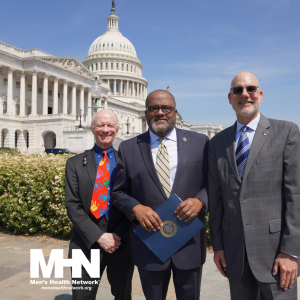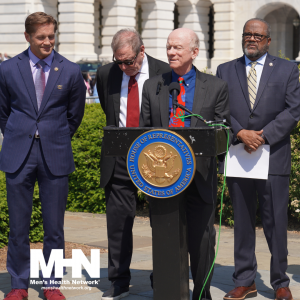Congressional Men’s Health Caucus Shows Bipartisan Consensus on Prevention, Mental Health, & Closing the Lifespan Gap
The leadership of the 2025 Congressional Men's Health Caucus announces plans for 2 resolutions drawing attention to life expectancy and men's health.
As an original and continuing partner to the Caucus, Men’s Health Network (MHN) joined the Caucus leadership to spotlight rising rates of preventable disease, the mental health crisis among men, and the widening lifespan gender gap, now over 5.3 years between men and women. Together, caucus leaders pledged to shift the conversation from reaction to prevention and from silence to empathy.
“We welcome the progress that has been made in women’s health, and we are working to help men learn from those successes.” Said Ronald Henry, President of Men’s Health Network. “Reducing premature death and disability among men isn’t just important for the men themselves; it’s important to the wives, sisters, and daughters who love them.”
Henry also addressed the rising gender gap in life expectancy, noting that it is not fixed or inevitable. “The Lifespan Gender Gap rises and falls over time with both medical advances and public health advances. From a peak of 7.7 years in 1979, the Lifespan Gender Gap was reduced by three full years to 4.7 years by 2010. Unfortunately, the Lifespan Gender Gap began growing again in 2015, and that is not good for any part of American society,” he said.
A Bipartisan Push for Prevention and Policy
“Men’s health isn’t a partisan issue—it’s a public health issue,” said Rep. Troy A. Carter, Sr. (D-LA), the new caucus chair. “This caucus is about saving lives, supporting families, and making sure men get the care, information, and encouragement they need to stay healthy.”
Carter, who assumed the caucus leadership following the passing of longtime advocate Rep. Donald Payne Jr., was joined by co-chairs Rep. Rich McCormick (R-GA), Rep. Rob Menendez (D-NJ), Rep. Ted Lieu (D-CA), and Rep. Neal Dunn, M.D. (R-FL). Their joint leadership signals a strong bipartisan commitment to advancing policies that promote better health for men, boys, and their families.
In addition to the resolutions and bills planned for filing, Carter previously introduced the Men’s Health Workforce Act, which expands access to mental health services in underserved communities and also co-leads the PSA Screening for HIMs Act with Dr. Dunn, a bill that would require insurance coverage for prostate cancer screenings for high-risk men.
Medical Voices and National Partners Weigh In
Rep. McCormick, an ER physician, pointed to the preventable nature of many chronic diseases facing men today—from obesity to renal failure—and called for a renewed national focus on daily fitness, screenings, and personal accountability.
About the Men’s Health Caucus
The Congressional Men’s Health Caucus brings together policymakers, medical professionals, and community leaders to promote awareness, education, and policy solutions that address the unique health needs of men and boys. Through efforts focused on prevention, mental health, early detection, and closing the lifespan gap, the caucus seeks to ensure that more men live longer, healthier lives.
About Men’s Health Network
Men’s Health Network (MHN) is a national nonprofit organization whose mission is to reach men, boys, and their families where they live, work, play, and pray. Since 1992, MHN has led the charge in public health education, community outreach, and policy advocacy to improve the health and well-being of males of all ages.
Learn more at www.MensHealthNetwork.org
Jennifer Thompson
Men's Health Network
communications|menshealthnetwork.org| |communications|menshealthnetwork.org
Visit us on social media:
LinkedIn
Instagram
Facebook
YouTube
X
Other
Legal Disclaimer:
EIN Presswire provides this news content "as is" without warranty of any kind. We do not accept any responsibility or liability for the accuracy, content, images, videos, licenses, completeness, legality, or reliability of the information contained in this article. If you have any complaints or copyright issues related to this article, kindly contact the author above.
OpenPayd Showcases Vision for Embedded Finance at IFGS 2025
DIALOG Sprachreisen: Qualitäts-Sprachreisen und Sprachaufenthalte weltweit
Decking de madera exportado por Colombia con evidencia de ilegalidad: vinculada al conflicto y llega a mercados globales
Kalendarium
Więcej ważnych informacji
 Jedynka Newserii
Jedynka Newserii

 Jedynka Newserii
Jedynka Newserii

Infrastruktura

Przed Europą wiele lat zwiększonych wydatków na zbrojenia. To obciąży krajowe budżety
– Bezpieczeństwo militarne trzeba finansować bezpiecznie, uwzględniając bezpieczeństwo finansów publicznych, bezpieczeństwo ekonomiczne – mówi dr Sławomir Dudek, prezes Instytutu Finansów Publicznych. Proponowane przez KE poluzowanie reguły fiskalnej pozwalającej na mocniejsze zadłużanie się rządów to zdaniem ekonomistów krok we właściwym kierunku, ale skuteczny na krótką metę. W dłuższej perspektywie konieczne jest wspólne unijne finansowanie, np. w ramach nowego budżetu UE, i wspólne programy zbrojeniowe, a także szukanie kapitału na rynkach finansowych.
Prawo
Duże projekty fotowoltaiczne w Polsce mocno spowolnione. Największymi problemami nadmierna biurokracja i chaos interpretacyjny

Długotrwałe procedury, nadmierna biurokracja i często niejednoznaczne interpretacje przepisów hamują rozwój fotowoltaiki w Polsce – wynika z raportu Polskiego Stowarzyszenia Fotowoltaiki. Inwestorzy wskazują uzyskanie warunków przyłączenia jako najbardziej problematyczny etap procesu inwestycyjnego. Barierą jest też skala wydanych odmów przyłączenia do sieci, co odstrasza inwestorów. Zmiany są konieczne, zwłaszcza w kontekście dyrektywy RED III, która wskazuje na konieczność przyspieszenia, uproszczenia i ujednolicenia procedur administracyjnych dla inwestycji w OZE.
Konsument
Czterech na 10 Polaków miało do czynienia z deepfake’ami. Cyberprzęstępcy coraz skuteczniej wykorzystują manipulowane treści

Deepfaki, czyli wygenerowane bądź też zmanipulowane przez sztuczną inteligencję zdjęcia, dźwięki lub treści wideo, to jedna z najbardziej kontrowersyjnych technologii naszych czasów. Do jej tworzenia wykorzystywane są zaawansowane algorytmy AI, dlatego użytkownikom coraz trudniej jest odróżnić treści rzeczywiste od fałszywych. Z raportu „Dezinformacja oczami Polaków 2024” wynika, że cztery na 10 badanych osób miało do czynienia z takimi treściami. To o tyle istotne, że deepfaki bywają wykorzystywane do manipulacji, szantażu, niszczenia reputacji, oszustw i wyłudzeń finansowych.
Partner serwisu
Szkolenia

Akademia Newserii
Akademia Newserii to projekt, w ramach którego najlepsi polscy dziennikarze biznesowi, giełdowi oraz lifestylowi, a także szkoleniowcy z wieloletnim doświadczeniem dzielą się swoją wiedzą nt. pracy z mediami.









.gif)

 |
| |
| |
|